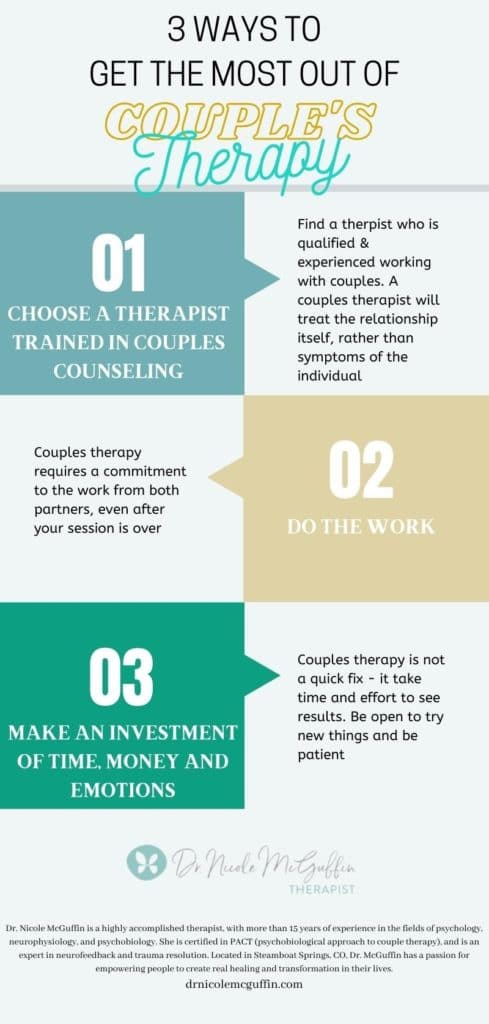
Can couples therapy save your relationship? Probably. Couples therapy can work wonders, but it is not an instant fix. If you trust the process, couple’s therapy will help you improve the quality of your life within that relationship.
Your relationships are a powerful force. A Harvard study showed more than money, fame, social class, or genes; relationships keep people happy and healthier throughout their lives.
Psychiatrist and Harvard Medical School professor, Robert Waldinger stated, “the surprising finding is our relationships and how happy we are in our relationships has a powerful influence on our health.”
Relationship satisfaction is a major predictor of happiness. As a form of self-care, tending to your relationship can protect you from feeling discontent and delay physical and mental decline.
And yet, we often seek therapy for ourselves and not our relationships.
But how can couples therapy help? If you’ve been living with dissatisfaction in your relationship for a long time, you may have adapted to negative interactions with your partner.
This is where your therapist’s neutrality, training, and outside perspective can be most valuable.
Relationships are vital for happiness and health – is yours creating more discontent than happiness? If this is the case and you are considering couples therapy, here is how to get the most out of your time and investment.
1. Choose a Therapist Trained in Couples Counseling
While, 80% of therapists offer couples counseling in their practices, most have no training in it. And this is a big deal.
Individual therapy is different than couples therapy. When seeing a therapist for individual therapy, you discuss your own issues and challenges; however, in couple’s therapy you discuss the relationship itself.
It is important to work with a therapist who is trained in couple’s therapy and understands the particular challenges of working with couples.
You will also benefit from an experienced relationship therapist who has worked extensively in this area and can offer you specific tools and skills for having effective conversations; tools that work best in the context of a long-term, committed relationship.
Individual therapy and couples therapy are not interchangeable, and a therapist with no understanding of the dynamics in a committed relationships is unlikely to be able to help you navigate them.
The main difference is that in couple’s therapy, the relationship is the client. Rather than focusing on symptoms of each individual, the system of the relationship is treated.
Outdated approaches like conscious processes and cognition don’t work in couples therapy, yet they are still widely used by many therapists with no specialized training in relationship counseling.
So, what is couples therapy, and why should you consider it?
What is couples therapy?
Couples therapy is counseling for intimate partners. Effective sessions help couples resolve conflicts and improve their relationship. Couples counseling is usually recommended after a couple has experienced problems in their relationship or after they’ve tried other methods of resolving conflict without success.
Couples therapy can help couples overcome issues such as:
- infidelity
- communication problems
- jealousy
- loss of sexual connection
- money conflicts
- trust issues
Couples therapy and marriage counseling are terms used interchangeably.
What does couples therapy involve?
Couples therapy commonly happens over 10-12 sessions for 2-3 hours.
Each couple is different, but the standard structure of a couple’s therapy session includes:
1) An agenda setting discussion to outline problems and concerns.
2) Reviewing one or two specific events from the week that included conflict.
3) Recognizing the emotions felt by each partner, learning how to regulate self and each other to stay within a range that is manageable.
4) Problem solving how to resolve future conflicts, build trust, or address difficult issues through understanding automatic, fast responses.
5) Checking in on progress made in building a secure functioning relationship that involves emotional safety.
Through couples therapy, you may discover things about yourself that have significant impact on your relationship. For example, the way in which attachment you experienced as a young child influenced your brain, nervous system, and how you experience relationships.
How you co-regulate, trust, depend on your partner, and experience intimacy has roots in early attachment relationships. These are things that a therapist can help you understand.
When is individual therapy appropriate with couples?
Individual therapy is appropriate when the couple has a therapist, and each individual has their therapist. You can sign a release of information for all three therapists to work collaboratively, supporting the couple’s work.
If you are wondering whether you can see your couple’s therapist for individual sessions, that depends on the model your therapist follows. The orientation I follow The Psychobiological Approach to Couples Therapy (PACT) dictates this is a huge NO. Why is that?
- There needs to be complete transparency for fundamental safety and security to be present.
- Meeting alone creates opportunities for one person to feel like the other may build a stronger alliance with the therapist.
What is vital for you to know is that going to an individual therapist to work on your relationship will leave “a better chance of having your marriage harmed,” according to William Doherty of the University of Minnesota’s Marriage and Family Therapy Program.
Discussions with an individual therapist can undermine marital commitment due to the individualistic value orientation. There is a therapeutic alliance and a natural movement towards empathy, compassion, and support.
However, only one side of the story is shared. And your individual therapist will likely side with you, often encouraging a break-up.
Success Rate
The American Psychological Association states marriage therapy as being 75% effective.
Success rates in couples therapy depend on:
- the therapist’s skill
- the therapist using effective models
- dedication and commitment of both partners
Clubland and Anshan (2006) demonstrated couple relationships improved after marriage therapy, as did individual mental health for the participants in the study.
The research is clear that more people stay together after couples counseling than those that don’t get help.
Barriers to success include:
- when a spouse chooses not to take responsibility and change their behaviors
- couples don’t use what they learned in therapy
- an unwillingness to continue treatment for the period required to create the changes needed.
Of course, the type of couples counseling you seek will also impact your relationship’s gains.
What are the different approaches to couples therapy?
There are many types of couples therapy. Three popular methods are the Gottman method founded by John and Julie Gottman, Emotionally Focused Therapy founded by Sue Johnson, and Psychobiological Approach to Couple Therapy (PACT) founded by Stan Tatkin.
I am trained in PACT therapy and find this approach to be the most effective in helping couples to get the most out of therapy. PACT is based on the understanding that our nervous system, and the way we interact with our partner, is based on our early attachment experiences.
These experiences create implicit memories that guide our behavior in our current relationship. If secure functioning is not learned, these early memories that get projected can create dysregulation in our relationship.
Psychobiological Approach to Couple Therapy (PACT)
- Teaches partners to attend to each other’s state shifts in real-time
- Does not try to change the individual but to accept each person as they are
- Interventions are done through the couple, not the individual
- Partners learn to attune to each other
- Partners are responsible for each others care, creating more interdependency
- Partners are responsible for learning each others guidebook, understanding each other and respond with care and relief
- Conflict is worked through in real-time, solving the heart of the issue, creating new experiences to enter implicit memory
- Roller chairs are used for toward and away movement
- Video playback for misappraisals (with client permission)
- Longer sessions to work through dysregulation
- Learn to manage social-emotional deficits
2. Do The Work From Each Therapy Session
You will learn a lot in couples therapy, but you need to do the work to have lasting change. As you face what this means, first, it is prudent to understand some common issues that bring couples to therapy:
- Time, money, sex, mess, kids
- Negative communication
- Feeling alone in the relationship
- Excessive fighting
- Not feeling close or intimate
- Betrayal including affairs and infidelity
- Emotional distance
- Overcoming trauma
- Unmet emotional needs
- Other things coming before the partner (work, exercise, substances, people, etc.)
These are just some of the issues that you may seek help. As you begin the work of couples counseling, how can you prepare?
How to Prepare for Therapy
There’s not a lot you need to do to prepare for therapy. However, if you are hoping for the best outcome, some mental states will benefit as you come into your first session.
- Come with an open heart
- Be honest about your feelings, experiences, the bad and good, and your contribution to the system that was co-created
- Come in willing to work on the problems mutually with your partner, not to work on your partner
You will also want to be sure that you have realistic expectations of what therapy can do for your relationship.
Therapy is a process, and it will require both effort and time from both partners to see real change. It is also important to keep in mind that, while a therapist can offer guidance, insight, and support, it is ultimately up to the partners to make the changes necessary for the relationship.
What should you not tell your therapist?
The goal of therapy is to work collaboratively with your partner and therapist, one problem at a time. And, if you are tempted, there are three things you should hold back from telling your therapist:
- Lies to make yourself look better than your partner
- Half-truths to distort reality
- Secrets to keep from your partner
This may seem obvious, but couple therapists are encouraged to have a no secrets rule. If you email them and share information without others’ knowledge, they will encourage you to share sensitive information with your partner. It’s essential that you have a safe and open relationship with your therapist in order for therapy to be successful.
Resolution
If you seek PACT therapy, here are just some of the areas of resolution you can look forward to as you create a secure functioning relationship;
- Feeling more in love again
- How to resolve an issue quickly (under 30 minutes – or even quicker) so it does not go into long term memory
- How to collaborate with justice, sensitivity, cooperation, and true mutuality
- You and your partner protect the safety and security of your relationship at all times
- If one of you are in distress, the other drops what they are doing to minister to that partner
- Your relationship is based on collaboration and cooperation, with decisions serving both a personal and mutual good
- Power is shared; you both are bosses
- The existence of your relationship is not threatened
- You both protect your primacy as partners from third things, third tasks, and third people that threaten safety and security
- You and your partner are the go-to persons for all matters, making sure you each are the first to know, not the second, third, or fourth, in all issues of importance
- You and your partner greet each other with good cheer
- You and your partner protect each other in public and private from harmful behaviors, including your own
- You and your partner put each other to bed each night
- You both correct perceived errors, including injustices and injuries, at once or as soon as possible, and without stated excuses, intentions, or explanations
- You both gaze lovingly upon each other daily and make meaningful gestures of appreciation, admiration, and gratitude
- You both master the ways of seduction, influence, and persuasion, and avoid the use of fear or threat
- You both become experts on each other
A secure functioning relationship means you and your partner can work from a shared set of principles to architect the relationship that will be great for you both.
PACT explores how you relate, how you attune to each other, how to move the ball forward in arguments, and how to create mutual respect and care.
However, to get the gains from PACT therapy, you’ve got to commit the time and investment it takes.
3. Commit to the investment of time, money, and the emotional expenditure couples therapy requires
To get the most out of couples therapy, you will need to commit to the investment of time and money, making your relationship a priority. Successfully done, this will not only benefit you and your partner, but your health, happiness, longevity, children, and even society.
How many sessions will it take?
The number of sessions will vary based on the couple however, PACT therapy typically requires fewer sessions than other therapies. Sessions are longer than the traditional 50-minute session, two to three hours in length.
Attending ten sessions in a row will be more effective than attending ten sessions over ten months.
When things go wrong, you will have more opportunities to understand and adopt what you learn with quicker corrections.
How much does couples counseling cost?
Couples counselor’s rates vary widely depending on the level of education, experience, and location.
PACT therapy sessions can range from $300-$500, and my two-hour PACT sessions are $360 ($180 per hour).
How is online relationship therapy different from traditional, in-person sessions?
Online therapy has become normalized and common with the onset of the pandemic. Going to a therapist online instead of in-person has pros and cons, and you’ll have to decide which option you are most comfortable with.
A 2019 study in Frontiers showed online therapy is just as effective as in-person therapy.
Pros
- Meeting in the convenience of your home
- More options in picking a therapist that may live in a different town
- More time for yourself by saving the commute
- Safe from COVID-19 and other viruses
Cons
- You may experience tech issues and internet freezing during sessions
- You may feel less comfortable and like it’s less personable seeing your therapist on a screen than in person
- There may be interruptions from other family members in your home
- You may feel there is not enough privacy in your home, and others can hear
- It may be more difficult for your therapist to notice body language, gestures, and micro-expressions – all of which inform the therapy
Whatever your choice is, the most important thing is starting couples therapy and getting the help you need. This information should help you decide on what kind of therapy to seek and the importance of seeing counselors with specialized training in couples’ work.
If you are located in Colorado and you’d like a free consultation for PACT therapy, you can call 970-439-1938.

Dr. Nicole McGuffin, PsyD
Dr. Nicole McGuffin is a highly accomplished therapist, with more than 15 years of experience in the fields of psychology, neurophysiology, and psychobiology. She is certified in PACT (psychobiological approach to couple therapy), and is an expert in neurofeedback and trauma resolution. Located in Steamboat Springs, CO, Dr. McGuffin has a passion for empowering people to create real healing and transformation in their lives.




